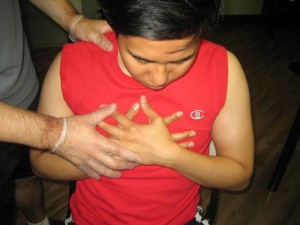Chest Pains: Never Ignore those Heart Breakers
Never ignore chest pains. It could be a heart attack. If you have muscle pains around your chest area and the pain feels heavy and tight while forcing you to press or tighten up the area, you could be facing a mild to severe heart attack. When this happens, immediately call 911.

Signs and symptoms of heart trouble
There are signs to look for while experiencing a heart problem. In fact, if the pain lasts longer than 15 minutes and you feel it becoming severe, it can spread. The pain can slowly maneuver towards other parts of your body such as your jaw, back, and arms. Other symptoms are nausea, coughing up blood, sweats, and even, difficult breathing.
Another factor to consider is the risk of having coronary heart disease. There are a number of factors to having heart disease: smoking, obesity, high blood pressure, high cholesterol, and diabetes. Questioning yourself as well as your doctor with “Could I have a heart problem?” should be addressed. Although, chest pain is not always going to lead towards a heart problem, yet, it is a symptom should that should never go unattended or overlooked.
Angina: another heart attack
For instance, “angina” is a problem where the blood supply to your muscles of your heart are restricted versus the “heart attack” which is where the blood supply suddenly gets blocked from your heart. Ironically, both of these heart conditions feel heavy, tight and can cause severe pain in the chest area where it eventually spreads, again, to other parts of the body. The difference from the two is that angina is triggered by emotional tension and stress and also, physical activity.
Notably, if you have been diagnosed with this condition your doctor might have prescribed you with an angina medication. You can generally take the medication, if ineffective the first time, 5 minutes after the first dosage if the pain persists. Check with your doctor about the specifics in doing this during your next doctor’s visit. Additionally, this specific condition (angina) can get better with lying down and getting lots of rest. On the other hand, if pain persists for more than 15 minutes, while resting, such as vomiting and sweating, it can be a sign of a heart attack. Dial 911 immediately if this occurs.
If you feel someone else is having these symptoms, get help immediately. In fact, if you, or the person who is having these symptoms, haven’t been diagnosed with a heart condition, this is more of a reason to get medical attention.
Other common “heart-breakers”
Most common causes of chest pains are not all heart-related and can be mistaken for a heart attack. The most common chest pain triggers are anxiety and panic attacks. These two common heart triggers can cause episodes of pain in the chest area. More often than not, it can be a symptom of having an anxiety attack. There are pain related feelings that come with having the overwhelming sensation of anxiety. The following are the symptoms of them: heart palpitations, sweats, dizziness, and difficulty breathing.
Finally, when you feel an overwhelmingly heavy and tight painful feeling around your chest area, don’t ignore it. There are reasons for this certain condition in that area. Think about your family medical history. And remember, if you, or someone you know, are a smoker and have these symptoms, take precaution. These symptoms can lead to heart problems; and if you, or someone you know, have been diagnosed with “angina”, do not ignore the pain, take action by seeking medical attention and advice from your doctor. If that means call the ambulance, call because these precautions could mean saving your life, or even someone else’s.
Related Video On Chest Pain
https://www.youtube.com/watch?v=9E0xxCROnqY
